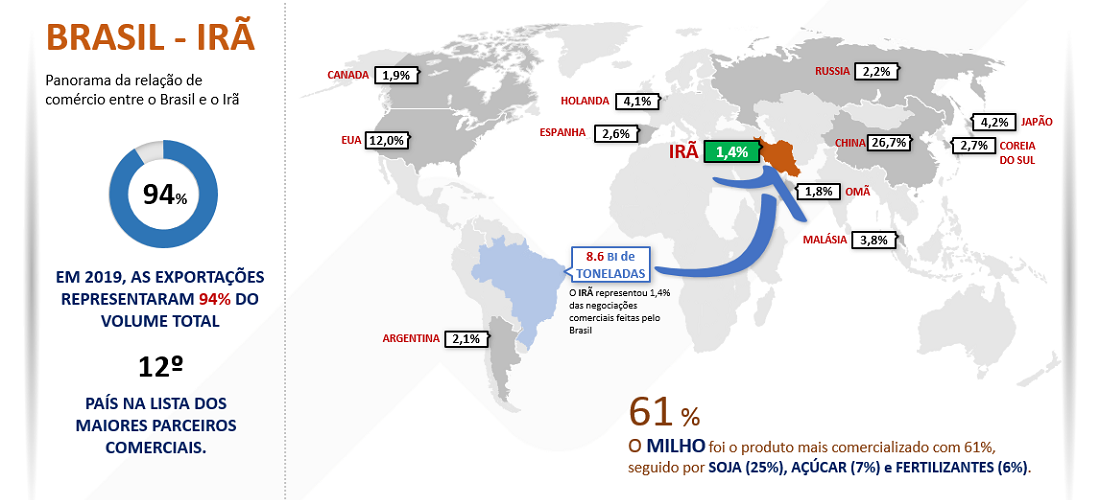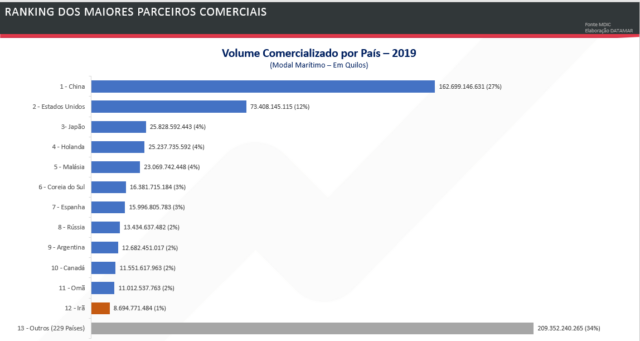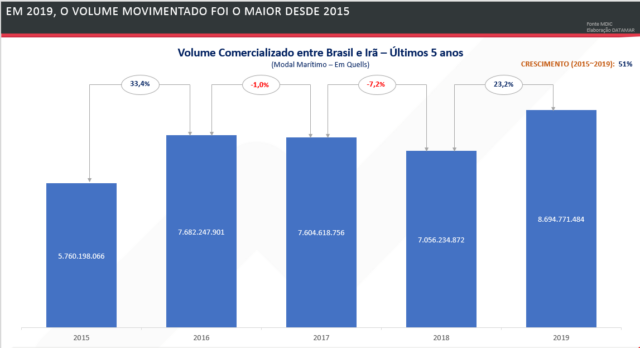
Brazil evaluates possible impact of US Iran crisis on its exports to Iran
Jan, 11, 2020 Posted by Sylvia SchandertWeek 202003
Brazil’s Minister of Agriculture, Livestock and Supply, Tereza Cristina, has said the possible impact of the United States – Iran crisis on Brazilian exports should be carefully monitored. “It’s too early to say, it’s a tense moment for the whole world, but it hasn’t affected us yet,” she said.
A study by Datamar, based on MDIC data, found that Iran is Brazil’s 12th largest trading partner, importing 8.6 billion tons of products by sea. The top Brazilian trading partners is China, followed by the United States, Japan, the Netherlands, Malaysia, South Korea, Spain, Russia, Argentina, Canada and Oman.
Source: Datamar
Brazil is the largest exporter of corn to Iran. According to the Ministry of Agriculture, sales amount to about US $ 1 billion, which amounts to about half of the trade balance between the two countries.
In addition to corn, which accounts for 61% of the volume, other products traded are soybeans (25%), sugar (7%) and fertilizers (6%).
Datamar’s study also pointed out that Iran accounts for 1.4% of Brazil’s total trade in 2019, and that Brazilian exports represent 94% of the volume traded between the two nations.
Perhaps the most noteworthy point raised by Datamar is that the volume traded between Brazil and Iran has grown 51% over the last five years.
Source: Datamar
Tereza Cristina acknowledges that there is apprehension among Brazilian farmers, but that “for the moment we have no reason to say that there was any kind of retaliation” by Iran against Brazil, she said. “The Arab countries, not only Iran, need a secure supply of food and Brazil is one of the countries that can provide this security,” she said. “Brazil is a great granary, we hope this issue settles down as soon as possible and that Brazilian agriculture can continue to produce and contribute to domestic and global supplies,” he said.
Tereza Cristina also recalled that Iran is a major importer of corn and soybeans, but that Brazil continues to find new markets. “We can’t put all our eggs in one basket,” she said. “We look forward to continuing to export to Iran, Saudi Arabia, the United Arab Emirates, Kuwait, and new markets in Asia, as well as China, with its large population and high growth rates,” she said. “These are countries that have import potential because they need large amounts of food. What the Ministry of Agriculture does is to seek to keep its options open: opening new markets, not putting all the eggs in one basket,” she emphasized.
-
Ports and Terminals
Oct, 07, 2020
0
CADE suspends ruling on controversial ‘THC2’ dry port fee
-
Ports and Terminals
Dec, 14, 2021
0
101 ships waiting for berth space at LA and Long Beach
-
Grains
Jun, 11, 2024
0
Brazil’s soybean production costs outpace global competitors
-
Sep, 13, 2024
0
High Melon Exports Drive Up Prices and Tighten Domestic Supply, Cepea Reports




